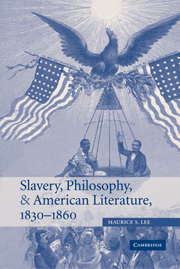Book contents
- Frontmatter
- Contents
- Acknowledgments
- Introduction
- 1 Absolute Poe
- 2 “Lord, it's so hard to be good”: affect and agency in Stowe
- 3 Taking care of the philosophy: Douglass's commonsense
- 4 Melville and the state of war
- 5 Toward a transcendental politics: Emerson's second thoughts
- Epilogue: An unfinished and not unhappy ending
- Index
Introduction
Published online by Cambridge University Press: 22 September 2009
- Frontmatter
- Contents
- Acknowledgments
- Introduction
- 1 Absolute Poe
- 2 “Lord, it's so hard to be good”: affect and agency in Stowe
- 3 Taking care of the philosophy: Douglass's commonsense
- 4 Melville and the state of war
- 5 Toward a transcendental politics: Emerson's second thoughts
- Epilogue: An unfinished and not unhappy ending
- Index
Summary
Moby-Dick (1851) begins with a provocative question and some advice on how to approach it. When Ishmael wonders, “Who aint a slave?” he asks his readers to ponder the subject “either in a physical or metaphysical point of view,” thereby announcing a dialectic that governs much of the book. The Pequod is an American ship-of-state run by a tyrant who masters his multiracial crew. It is also a stage for speculative rhapsodies about freedom, fate, and the tragedy of being enslaved by the quest for truth. Just as the white whale can represent chattel bondage and the boundaries of human understanding, Moby-Dick treats slavery as a political and a philosophical crisis as Melville, like many of his peers, struggles to reconcile the two points of view. What were the social consequences of antebellum metaphysics? By what criteria and method should slavery be judged? Could philosophy settle the slavery controversy, or was it part of the problem? Such questions loomed over United States literature between 1830 and 1860 as the slavery crisis exposed the limits of national consensus and rational authority.
Among the antebellum thinkers who strained against such limits were Edgar Allan Poe, Harriet Beecher Stowe, Frederick Douglass, Herman Melville, and Ralph Waldo Emerson. Although these authors are rightly regarded as literary figures, all brought sophisticated philosophical arguments to the slavery debate. Poe derives a theory of slavery and racism from German and British romanticism.
- Type
- Chapter
- Information
- Publisher: Cambridge University PressPrint publication year: 2005



